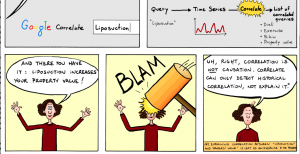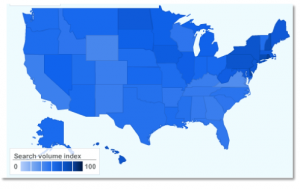WordPress SEO URL / Permalinks considerations
May 24, 2011The Latest On Panda Straight From Google
May 26, 2011by Vanessa Fox
I love search data. Being able to mine through millions of search queries to find out what people are really interested in is fascinating (and useful!). Google provides search data a number of ways, including Google Trends, Google Insights for Search, and via the Google AdWords Keyword Tool, and Microsoft has some great stuff via its Excel Advertising Intelligence add in (if you have Office 2007 or higher running on Windows).
Google has also done some cool things with search data, including forecasting Flu Trends and predicting the impact of the Gulf oil spill on tourism in Florida. Now, they’ve created a tool to enable you to correlate search trends with any data you might want to throw into the mix. How awesome is that? (Hint: very awesome.)
With Google Correlate, you can upload data charted over either time or space and Google will look for matching patterns in search volumes. If you don’t have data of your own to upload, you can simply specify search terms, and Google will calculate the trending pattern and show matching patterns.
As Google notes in their documentation, this is sort of the opposite of Google Trends:
Google Correlate is like Google Trends in reverse. With Google Trends, you type in a query and get back a data series of activity (over time or in each US state). With Google Correlate, you enter a data series (the target) and get back a list of queries whose data series follows a similar pattern.
It appears that right now, you can either upload time-based data or state-based data (but not international data). You can even just draw a line on a graph and see what correlates!
 I have apparently drawn the line that most correlates to people searching for Panera Bread:
I have apparently drawn the line that most correlates to people searching for Panera Bread:
The comic Google created to explain the new tool is careful to point out (multiple times!) that correlation does not necessarily equal causation. The states where Glee is performing in concert and searches for [the dreamiest] may have the same spikes, but that doesn’t necessarily mean the two are related.
They might be though. At O’Reilly’s Where 2.0 conference last month, I did an Ignite talk showing that people were interested in Rebecca Black everywhere, but were only really interested in March Madness in states that had teams participating.
Interest in Rebecca Black:
Interest in March Madness (states with participating teams and state-based search interest):
I feel like there could be some really interesting integrations between this and Google’s Public Data Explorer, but Google Correlate is in labs, so give it some time.
If you want to check it out for yourself, Google has a tutorial, FAQ, and whitepaper.




